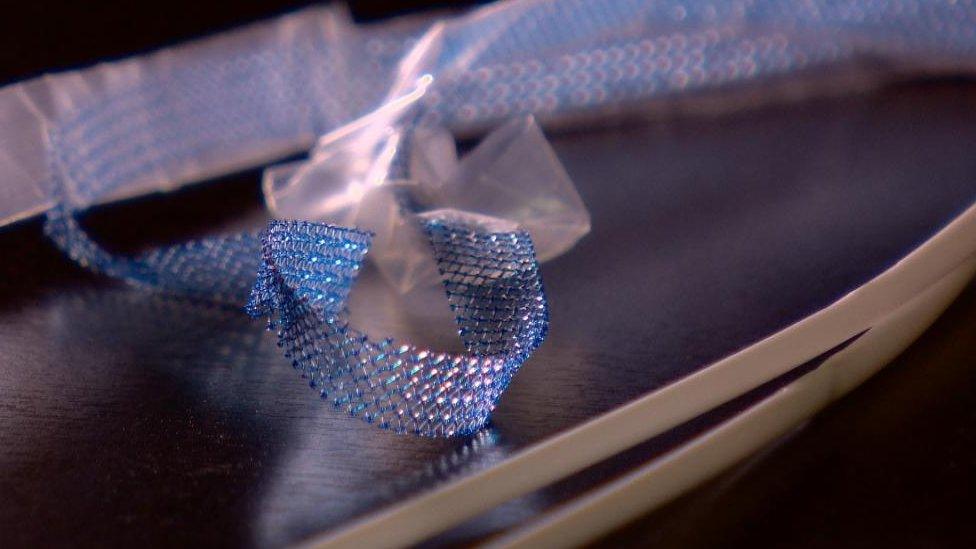Mesh implants treatment brings unnecessary risks says study
- Published

Mesh operations are used to ease incontinence and pelvic prolapse
Using mesh implants to treat pelvic prolapse brings unnecessary risks, according to new research.
But the findings, published in The Lancet, external, suggested mesh does not lead to more complications than other types of surgery for treating incontinence.
The study, the first of its kind, looked at treatment and hospital readmission over the past 20 years.
Its conclusions are expected to influence the Scottish government policy on the use of mesh transplants.
In June 2014, the then Health Secretary Alex Neil called for health boards to suspend their use pending investigations into their safety. And he set up an independent review of mesh.
This latest study forms part of that review.
It is one of two complimentary mesh studies to being published. Both found that using mesh to treat pelvic prolapse leads to a higher level of complications than other surgery.
But - contrary to expectations - the study found that hospital readmission rates were similar to those for other types of incontinence surgery not involving mesh.

Mesh implants are used to treat pelvic organ prolapse and incontinence
It found that more than one in ten of the women treated for incontinence with mesh implants were readmitted to hospital because of complications.
Within five years more than 2,000 women were readmitted. But the proportion of those readmitted to hospital after other surgery for incontinence is similar at around 11%.
The study has been published just days after BBC Scotland revealed that more than 400 women have received mesh implants since the Scottish government called for their use to be suspended in 2014 because of safety concerns.
The research was led by Dr Rachael Wood, a consultant in public health medicine at the Information Services Division.
She said: "It's important to consider the results for prolapse and incontinence separately. With prolapse the study found that mesh is less effective and more likely to lead to complication.
"Mesh for prolapse should not be recommended as a first line treatment. But for incontinence the study supports the use of mesh.
"Stress urinary incontinence and pelvic organ prolapse are common conditions affecting many women and substantially reducing their quality of life. It is important that safe and effective treatments can be offered to women affected by incontinence and prolapse."

Dr Rachael Wood, who led the study, said it was important to offer women safe and effective treatments
She added: "We hope that our study will help women who are contemplating treatment to make a more informed decision."
Dr Wael Agur, a consultant gynaecologist and lead clinician on the study, said some of the results were surprising.
The study only looked at hospital readmission within five years of treatment. But he warned that complications could present more than a decade later.
"It is a lifetime risk," he told BBC Scotland.
"We know of patients who have developed complications 14 years later. This study is so important but it is just one piece of the puzzle.
"The study looked at those who were readmitted to hospital after surgery but did not look at the severity of the complications nor the impact on quality of life."
Mesh implants are used by surgeons to treat pelvic organ prolapse and incontinence in women, and sometimes in men.
Over the past 20 years, more than 20,000 women in Scotland have had mesh or tape implants. But some have suffered painful and debilitating complications.
In 2014, a number of campaigners gave evidence to Holyrood's petitions committee. Several of them were in wheelchairs - unable to walk because of surgical complications.

Dr Wael Agur, lead clinician on the study, said some of the results were surprising
As a result, the then Health Secretary Alex Neil wrote to health boards requesting a suspension in the use of mesh implants by the NHS in Scotland pending an investigation into their safety.
Since then, Greater Glasgow and Clyde has used the implants more than any other health board - with 178 mesh and mesh tape implants. NHS Lothian have performed 146 mesh and tape implants.
The boards still using mesh implants said they discussed all the potential risks with patients before surgery.
Elaine Holmes of Scottish Mesh Survivors said: "The ISD report is flawed because of the very way the department collects figures.
"Their data is collected using the number of patients who required a hospital bed. Mesh injured patients treated as outpatients at clinics or by their GP's have not been counted or included in this study.
"We know of patients who have endured multiple removals, some have endured a dozen procedures or more, but they are still only counted by ISD as having had just one complication. That is plainly wrong.
"The study also fails to highlight the severity of the complications or the impact they have had on a patient's life, a glaring omission since so many of us have ended up in wheelchairs and crippled for life."
She added: "The ISD study has also only looked at figures dating back five years, the very minimum that can be considered 'longer term' despite the fact many extremely painful mesh injuries do not come to light until 10 or even 15 years after the original surgery.
"It may take years for a polypropylene mesh implant to harden, shrink or fragment, moving through the body and causing crippling side effects."
- Published19 December 2016

- Published19 December 2016

- Published6 October 2015

- Published1 March 2015

- Published24 February 2015

- Published3 June 2014
